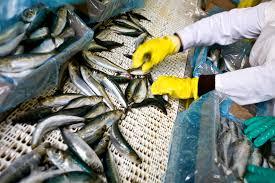ARM’s FISH (Collaborative Robotics to Foster Innovation for Seafood Handling) Project, led by Northeastern University, was awarded a $2.5M grant from the National Science Foundation. The FISH Project was awarded ARM funding through the organization’s first formal Technology Project Call that took place in October 2017.
The FISH Project directly addresses major technology and workforce gaps in the US fishing industry. Current processes see the fish being caught domestically then shipped abroad to be thawed, processed, and chemically treated before being returned for distribution. This process is costly, time-consuming, and leads to a higher risk of contamination. The project aims to keep these processes in the US through the development of a robotic system that can reliably grasp, place, flip, and squeeze seafood while working collaboratively with human workers in a constrained factory environment. Additionally, due to a workforce shortage, the US imported record amounts of seafood in 2017. The anticipated results from the project will aid in supplementing and assisting the existing workforce to better serve the demand.

According to Dr. Taskin Padir from Northeastern University, the project’s principal investigator, the FISH Project is estimated to amount to $20B in economic impact each year within the next 5-10 years. The developed technology also has possible future applications in the meat, plastics, and textile industries.

